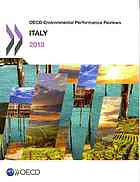
OECD environmental performance reviews. Italy 2013. PDF
Preview OECD environmental performance reviews. Italy 2013.
OECD Environmental Performance Reviews 2 0 1 3 italy OECD Environmental Performance Reviews The OECD Environmental Performance Review Programme provides independent assessments of countries’ progress in achieving their domestic and international environmental policy commitments, together with policy relevant recommendations. They are conducted to promote peer learning, to enhance countries’ accountability italy to each other and to the public, and to improve governments’ environmental performance, individually and collectively. The Reviews are supported by a broad range of economic and environmental data. Each cycle of the Environmental Performance Reviews covers all OECD member countries and selected partner countries. The most recent reviews include: Mexico (2013), Germany (2012) and Slovenia (2012). 2013 This report is the third OECD review of Italy’s environmental performance. It evaluates progress towards sustainable development and green growth, with a focus on policies that promote more effective and efficient water management and provide better incentives to tackle climate change. Contents Part i. Progress towards sustainable development Chapter 1. Key environmental trends Chapter 2. Policy-making environment Chapter 3. Towards green growth Part ii. Progress towards selected environmental objectives Chapter 4. Multi-level environmental governance: Water Chapter 5. Climate change Further information about the EPR programme is available on line via www.oecd.org/env/countryreviews O E C D E n v ir o n m e n t a l P e r f o r m a n c e R e v ie w s it Consult this publication on line at http://dx.doi.org/10.1787/9789264186378-en. a l y This work is published on the OECD iLibrary, which gathers all OECD books, periodicals and statistical databases. Visit www.oecd-ilibrary.org for more information. 2013 isbn 978-92-64-18392-6 -:HSTCQE=V]X^W[: 97 2013 04 1 P OECD Environmental Performance Reviews: Italy 2013 This work is published on the responsibility of the Secretary-General of the OECD.The opinionsexpressedandargumentsemployedhereindonotnecessarilyreflecttheofficial viewsoftheOrganisationorofthegovernmentsofitsmembercountries. This document and any map included herein are without prejudice to the status of or sovereigntyoveranyterritory,tothedelimitationofinternationalfrontiersandboundaries andtothenameofanyterritory,cityorarea. Pleasecitethispublicationas: OECD(2013),OECDEnvironmentalPerformanceReviews:Italy2013,OECDPublishing. http://dx.doi.org/10.1787/9789264186378-en ISBN978-92-64-18392-6(print) ISBN978-92-64-18637-8(PDF) Series:OECDEnvironmentalPerformanceReviews ISSN1990-0104(print) ISSN1990-0090(online) ThestatisticaldataforIsraelaresuppliedbyandundertheresponsibilityofthe relevantIsraeliauthorities.Theuse ofsuchdatabytheOECDiswithoutprejudicetothestatusoftheGolanHeights,EastJerusalemandIsraeli settlementsintheWestBankunderthetermsofinternationallaw. Photocredits:Cover©IakovKalinin–Fotolia.com,©Samott–Fotolia.com. CorrigendatoOECDpublicationsmaybefoundonlineat:www.oecd.org/publishing/corrigenda. ©OECD2013 Youcancopy,downloadorprintOECDcontentforyourownuse,andyoucanincludeexcerptsfromOECDpublications,databasesand multimediaproductsinyourowndocuments,presentations,blogs,websitesandteachingmaterials,providedthatsuitable acknowledgementofOECDassourceandcopyrightownerisgiven.Allrequestsforpublicorcommercialuseandtranslationrightsshould besubmittedtorights@oecd.org.Requestsforpermissiontophotocopyportionsofthismaterialforpublicorcommercialuseshallbe addresseddirectlytotheCopyrightClearanceCenter(CCC)[email protected]çaisd’exploitationdudroitdecopie(CFC) [email protected]. PREFACE Preface O ver the past twoyears, Italy has made a tremendous effort to speed up long overdue structural reforms to put public finances on a sounder track, to revive and modernise its economy,andtorestoregrowthandcompetitiveness. This Environmental Performance Review of Italy, the third prepared by the OECD, provides analysis and policy recommendations on how to integrate environmental considerations in Italy’s broader reform agenda and strengthen the country’s environmentalperformance.Amongothermeasures,theReviewsuggeststhatshiftingthe tax burden from labour and capital to pollution and resource use could make the tax systemmoreefficientandprovidebetterincentivesforenvironmentalprotection. The report also argues that further development of renewable energy sources in conjunctionwithsmartgrids,aswellasexpandingsuccessfulenergyefficiencyinitiatives, couldhelpcreatethenewgreenmarketsandrelatedemploymentopportunitiesthatare needed for a transition to a low-carbon, resource-efficient economy.These initiatives shouldbeembeddedinalong-termenergystrategyinordertoprovideastableframework forinvestment. Inrecentyears,Italyhastakenmanypositiveenvironmentalinitiatives,particularlyin someregionsandbusinesssectors.Thesehaveledtoimpressiveachievements,including areductionofairemissionsandwaterpollution,animprovementinwastemanagement, and enhanced protection of biodiversity. However, these achievements are often partial andexhibitsignificantregionalvariations,afeatureoftheItaliansystemthatisreinforced byamajordevolutionoflegislativeandadministrativeresponsibilitiestothesubnational governments.Aconcertedeffortisnowneededtomaketheenvironmentalmanagement systemmorecoherentandeffective,andtoscaleuppositiveenvironmentalachievements. The Environmental Performance Review of Italy places a special focus on climate change, water management and green growth promotion. Among its specific recommendations,thefollowingonescanbeunderlined: ● prepare a green growth strategy that provides a clear, coherent and sufficiently long- termpolicyframeworktospurinvestmentinthegreeneconomy; ● strengthenthelinksbetweenthedisbursementofregionaldevelopmentfundsandthe achievementoftargetsfortheprovisionofenvironmentalservices; ● continue to simplify environmental requirements for small and medium-sized enterprises to reduce administrative costs and barriers while reinforcing efforts to combatenvironmentalcrime,especiallyrelatedtowasteandlanduse; ● apply economic instruments more systematically and streamline institutional arrangementsformanagingwaterresourcesatthelevelofriverbasins; ● restructurethetaxationofenergyproductstoexplicitlyincludeacarbontaxcomponent withaviewtoprovidingaconsistentpriceforcarbonacrosstheeconomy; OECDENVIRONMENTALPERFORMANCEREVIEWS:ITALY2013©OECD2013 3 PREFACE ● extendtheuseofprice-basedmechanisms,suchaspollutionandcongestioncharges,to reduce emissions from vehicle use in urban areas, and restructure vehicle taxation to includecomponentsreflectingCO emissionsandotherenvironmentalexternalities. 2 This Review is the result of a co-operative policy dialogue between Italy and other membersandobserversoftheOECDWorkingPartyonEnvironmentalPerformance.Weare confidentthatthiscollaborativeeffortwillbeusefultoadvancethepolicydebateonhow totacklethesharedenvironmentalchallengesfacedbyOECDmembersandtheirpartners. AngelGurría OECDSecretary-General 4 OECDENVIRONMENTALPERFORMANCEREVIEWS:ITALY2013©OECD2013 FOREWORD Foreword T heprincipalaimoftheOECDEnvironmentalPerformanceReviewprogrammeistohelpmember andselectedpartnercountriestoimprovetheirindividualandcollectiveperformanceinenvironmental managementby: ● helpingindividualgovernmentstoassessprogressinachievingtheirenvironmentalgoals; ● promotingcontinuouspolicydialogueandpeerlearning; ● stimulatinggreateraccountabilityfromgovernmentstowardseachotherandpublicopinion. This report reviews the environmental performance of Italy since the previous OECD Environmental Performance Review in 2002. Progress in achieving domestic objectives and internationalcommitmentsprovidesthebasisforassessingthecountry’senvironmentalperformance. Such objectives and commitments may be broad aims, qualitative goals, or quantitative targets.A distinctionismadebetweenintentions,actionsandresults.Assessmentofenvironmentalperformance is also placed within the context of Italy’s historical environmental record, present state of the environment,physicalendowmentinnaturalresources,economicconditions,anddemographictrends. TheOECDisindebtedtothegovernmentofItalyforitsco-operationinprovidinginformation,for theorganisationofthereviewmissiontoRomeandVenice(6-10February2012),andforfacilitating contactsbothinsideandoutsidegovernmentalinstitutions. Thanksarealsoduetoallthosewhohelpedinthecourseofthisreview,totherepresentatives ofmembercountriesparticipatingintheOECDWorkingPartyonEnvironmentalPerformance,and especiallytotheexaminingcountries:France,MexicoandSweden.ArepresentativeofSouthAfrica participatedinthereviewmissionasanobserver. Theteamthatpreparedthisreviewcomprisedexpertsfromreviewingcountries:Mr.Christophe Poupard (France), Mr. César Chavez Ortiz (Mexico) and Ms. Katrin Zimmer (Sweden); members of the OECD Secretariat: Ms. Aziza Akhmouch, Ms. Ivana Capozza, Mr. Brendan Gillespie, Mr.ReoKawamura,Mr.KrzysztofMichalak;andMr.JosephCurtin(consultant).Ms.CarlaBertuzzi andMr.ShayneMacLachlan(OECDSecretariat)andMr.JohnSmith(consultant)providedstatistical andeditorialsupportduringthepreparationofthereport.Preparationofthisreportalsobenefitted from comments provided by Ms. Claire Charbit, Mr. Xavier Leflaive, Mr. Paul O’Brien and other membersoftheOECDSecretariat. The OECD Working Party on Environmental Performance discussed the draft Environmental Performance Review of Italy at its meeting on 11October 2012 in Paris, and approved the assessmentandrecommendations. OECDENVIRONMENTALPERFORMANCEREVIEWS:ITALY2013©OECD2013 5 TABLEOFCONTENTS Table of contents Generalnotes .............................................................. 11 Executivesummary......................................................... 13 PartI Progresstowardssustainabledevelopment Chapter1. Keyenvironmentaltrends......................................... 21 1.Introduction.......................................................... 22 2.Transitiontoalow-carbon,energy-andresource-efficienteconomy ......... 24 3.Managingthenaturalassetbase ........................................ 29 4.Improvingtheenvironmentalqualityoflife............................... 32 Notes.................................................................. 35 Selectedsources ........................................................ 36 Chapter2. Policy-makingenvironment ....................................... 39 Assessmentandrecommendations........................................ 40 1.Keyenvironmentalandsustainabledevelopmentinitiatives ................ 42 2.Institutionalandco-ordinationframeworkforenvironmentalmanagement... 47 3.Environmentalpermitting,enforcementandcomplianceassurance ......... 49 4.Environmentalpolicyandperformanceevaluationmechanisms............. 53 5.Promotingenvironmentaldemocracy.................................... 56 Notes.................................................................. 60 Selectedsources ........................................................ 62 Chapter3. Towardsgreengrowth ............................................ 65 Assessmentandrecommendations........................................ 66 1.Economicpolicyandtheenvironment ................................... 69 2.Greeningthetaxsystem ............................................... 72 3.Environment-relatedexpenditureandinvestment......................... 78 4.Expandingenvironment-relatedmarketsandemployment ................. 85 5.Promotingenvironmentaltechnologiesandeco-innovation................. 89 6.Environment,tradeanddevelopment.................................... 96 Notes.................................................................. 101 Selectedsources ........................................................ 103 OECDENVIRONMENTALPERFORMANCEREVIEWS:ITALY2013©OECD2013 7 TABLEOFCONTENTS PartII Progresstowardsselectedenvironmentalobjectives Chapter4. Multi-levelenvironmentalgovernance:Water........................ 109 Assessmentandrecommendations........................................ 110 1.Keyenvironmentaltrends.............................................. 112 2.Evolutionofthepolicy,legalandinstitutionalframework forwatermanagement .................................................. 116 3.Governancechallengesinmanagingwaterresources ...................... 122 4.Governancechallengesinreformingwatersupplyandsanitationservices.... 129 Notes.................................................................. 135 Selectedsources ........................................................ 137 Annex4.A1. Institutionalmappingforwaterresourcesmanagement............... 139 Annex4.A2. Institutionalmappingforwatersupplyandsanitation ................ 141 Chapter5. Climatechange .................................................. 143 Assessmentandrecommendations........................................ 144 1.Overview............................................................. 147 2.GHGemissionperformance ............................................ 148 3.Policyframeworkforclimatechangemitigation........................... 152 4.Pricingcarbon ........................................................ 156 5.Climateandenergypolicies ............................................ 159 6.Climateandtransportpolicies.......................................... 171 7.Adaptation........................................................... 176 Notes.................................................................. 177 Selectedsources ........................................................ 179 References ................................................................ 183 I.A. Selectedeconomicdata ................................................. 184 I.B. Selectedsocialdata ..................................................... 187 I.C. Selectedenvironmentaldata ............................................. 188 II. Actionstakenonselected2002OECDreviewrecommendations ............... 193 III. Abbreviations .......................................................... 197 Tables 3.1. Energyandtransporttaxexpenditure.................................... 76 3.2. Selectedregionalenvironment-relatedindicators.......................... 85 4.1. OECDMulti-levelGovernanceFramework:atoolfordiagnosingco-ordination andcapacitygapsinthewatersector .................................... 120 4.2. Riverbasindistrictsandriverbasindistrictauthoritiesunder theEUWaterFrameworkDirective....................................... 122 5.1. SuccessiveroadmapstomeetingtheKyotoProtocoltarget.................. 154 5.2. Emissionreductionpotentialofmeasurestoachievethe2020target ......... 156 5.3. Progresstowardsthe2020renewableenergytargets........................ 163 5.4. Incentivesforelectricitygenerationfromrenewablesources ................ 165 8 OECDENVIRONMENTALPERFORMANCEREVIEWS:ITALY2013©OECD2013
